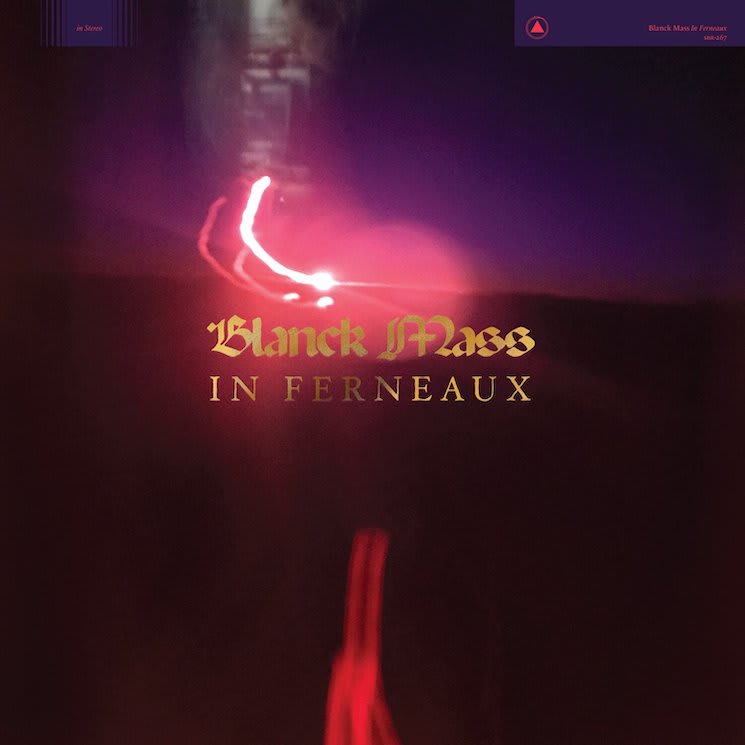"I think your destiny has been very hard and traveling," says a voice halfway through Benjamin John Power's sprawling fifth album as Blanck Mass. It's a fair assessment of both the lives of touring musicians in general and Power's electronic odysseys in particular. Blanck Mass records are intense, energetic affairs, harnessing the most kinetic elements of EBM, industrial and noise to fuel songs that are expansive in structure and propulsive in tempo. Be it the bristling blitzkrieg of 2017's World Eater or the climactic trance drops of 2019's Animated Violence Mild, Power's music often resembles some monstrous version of a perpetual motion machine.
So what does it sound like when that machine comes to a sudden and unexpected halt? In Ferneaux is a satisfying answer to that hypothetical. Made mostly during a period of COVID-imposed isolation, it consists of two tracks that hover around the 20-minute mark and run the gamut from placid drones to Merzbow-esque peals of paint-peeling static. Whether Power would've made such a record outside of the pandemic is impossible to know. Regardless of his motivation, In Ferneaux is a significant pivot, the moment when he takes his previously aggressive approach and sublimates it into something slower and more ethereal.
The result is a kind of aural travelogue — think the KLF's Chill Out without the pop samples or the exaggerated sense of humour. Both albums rely heavily on field recordings to establish a sense of setting. In Power's case, these snippets serve as both anchors and transitions, bringing the listener back down to Earth before transporting them somewhere new. Wind and waves offer a respite after the album's lone stretch of dance music, and birdsong diffuses a celestial synthesizer motif about 16 minutes through the first track.
For all its found sounds, though, In Ferneaux still bears Power's signatures, many of which take on new dimensions. Pitch-shifted vocal samples form the hook to many of his tracks, but here they feel off-kilter, scuttling across channels to eerie effect. When beats do appear, they're shrill and distorted compared to Power's usual earth-shaking low end. Abrasive at the best of times, his textures range from bruising to lacerating, with some passages echoing Ravedeath, 1972-era Tim Hecker. If the experience doesn't trigger Blanck Mass's usual adrenaline surges, at least it also skimps on the attendant exhaustion.
In Ferneaux is everything most Blanck Mass albums are not: patient, subtle and disarmingly low-key. It was made in confinement, but it takes Power to surprising new places.
(Sacred Bones)So what does it sound like when that machine comes to a sudden and unexpected halt? In Ferneaux is a satisfying answer to that hypothetical. Made mostly during a period of COVID-imposed isolation, it consists of two tracks that hover around the 20-minute mark and run the gamut from placid drones to Merzbow-esque peals of paint-peeling static. Whether Power would've made such a record outside of the pandemic is impossible to know. Regardless of his motivation, In Ferneaux is a significant pivot, the moment when he takes his previously aggressive approach and sublimates it into something slower and more ethereal.
The result is a kind of aural travelogue — think the KLF's Chill Out without the pop samples or the exaggerated sense of humour. Both albums rely heavily on field recordings to establish a sense of setting. In Power's case, these snippets serve as both anchors and transitions, bringing the listener back down to Earth before transporting them somewhere new. Wind and waves offer a respite after the album's lone stretch of dance music, and birdsong diffuses a celestial synthesizer motif about 16 minutes through the first track.
For all its found sounds, though, In Ferneaux still bears Power's signatures, many of which take on new dimensions. Pitch-shifted vocal samples form the hook to many of his tracks, but here they feel off-kilter, scuttling across channels to eerie effect. When beats do appear, they're shrill and distorted compared to Power's usual earth-shaking low end. Abrasive at the best of times, his textures range from bruising to lacerating, with some passages echoing Ravedeath, 1972-era Tim Hecker. If the experience doesn't trigger Blanck Mass's usual adrenaline surges, at least it also skimps on the attendant exhaustion.
In Ferneaux is everything most Blanck Mass albums are not: patient, subtle and disarmingly low-key. It was made in confinement, but it takes Power to surprising new places.
